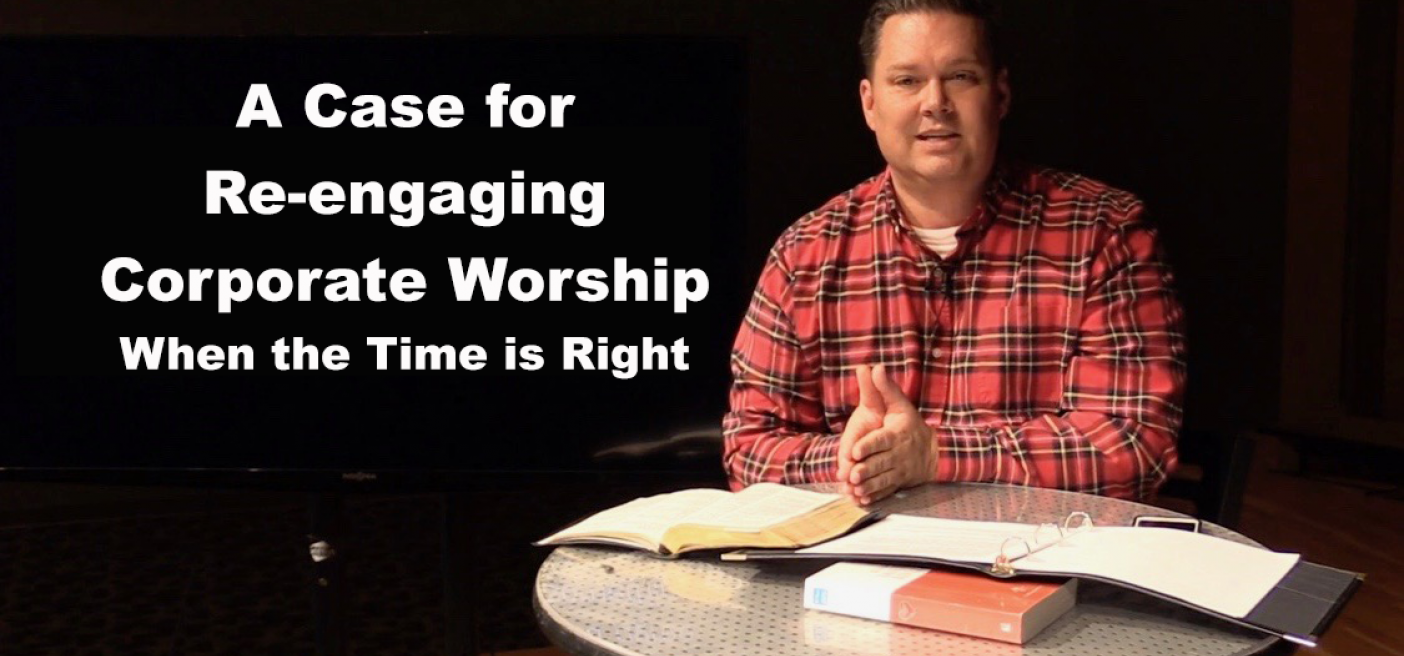A Case for Re-engaging Corporate Worship, When the Time is Right


Brad Cunningham, Lead Pastor
Liberty Heights Church
Corporate worship is the highest means of grace, and the means of grace are the God-ordained channels through which God unleashes his sanctifying, empowering grace into the lives of believers. If we want to grow, there is no hope apart from grace, and corporate worship is the primary vehicle through which God unleashes it.

Habits of Grace: Enjoying Jesus through the Spiritual Disciplines by David Mathis (Crossway, 2016) is available as a free download HERE David Mathis serves as executive editor at desiringGod.org
by Brad Cunningham, Lead Pastor, Liberty Heights Church
I had a leader tell me on a zoom call, “I can get used to going to church in my pajamas from the convenience of my own bed.” Also, around that same time, Tim Challies put out an article titled “Will they ever come back?” That comment, said in jest, along with the article, jogged my memory as to how David Mathis (Habits of Grace: Enjoying Jesus through the Spiritual Disciplines) built the case Biblically for corporate worship as a means of grace. For that very reason – we do not stream our services; we think it makes it too easy to devalue and neglect this as a means of grace. (We do have all the sermon videos up by Monday so people can keep current if they have to miss or are unable to come).
In our opinion, and that’s all it is – people are willing to skip church at the drop of a hat and justify it with “I’ll just watch it from home.” Without a theology connecting corporate worship as a means of grace, it’s hard to argue with their line of reasoning. If church is simply about getting “content” and building relationships, we can accomplish that via video teaching and home-based small groups with no need for a corporate gathering. We could funnel millions of dollars into missions by not building and staffing for corporate worship gatherings. If we argue that corporate worship is more than accessing content, we need to build our case Biblically, and we found Mathis’ explanation and argument convincing.
We live in a cultural climate where “it’s just what we are supposed to do” is on flimsy footing. And, I am not convinced that the simplistic, often repeated appeal to Hebrews 10:25 is adequate once it is further explored. The Christians in Hebrews were experiencing affliction to the degree that they were considering going back to Judaism. The writer in chapter 10 is encouraging them to continue to lean on interdependent relationships as one of the God-ordained vehicles for preserving in faith. Lean into each other when battling unbelief so that they continue persevering in the midst of affliction. Nor am I convinced that “do not forsake the assembling yourselves together” is referring to attending a corporate service, but rather a command to lean into the body of Christ given the statement in verse 24 to “spur one another on to love and good works.”
One-anothering happens in relationship environments, not corporate worship, lecture content environments. So, I would argue that Hebrews 10:25 is not less than attending church; it is much, much more than attending church. So – I don’t think it is the best defense for justifying the importance of corporate worship. Then what are we left with? The argument Mathis makes. Corporate worship is the highest means of grace, and the means of grace are the God-ordained channels through which God unleashes his sanctifying, empowering grace into the lives of believers. If we want to grow, there is no hope apart from grace, and corporate worship is the primary vehicle through which God unleashes it.
The Most Important Means of Grace
Corporate worship is the single most important means of grace and our greatest weapon in the fight for joy, because like no other means, corporate worship combines all three principles of God’s ongoing grace: his word, prayer, and fellowship. It is corporate worship, with its preaching and sacraments and collective praises, confessions, petitions, and thanksgivings, which most acutely brings together the gifts of God’s voice, his ear, and his body.
And so, according to Donald S. Whitney, “There’s an element of worship and Christianity that cannot be experienced in private worship or by watching worship. There are some graces and blessings that God gives only in ‘meeting together’ with other believers.”
Perhaps your own experience of corporate worship as a means of grace has, at times, echoed that of Martin Luther: “At home, in my own house, there is no warmth or vigor in me, but in the church when the multitude is gathered together, a fire is kindled in my heart and it breaks its way through.”
— Habits of Grace: Enjoying Jesus through the Spiritual Disciplines by David Mathis p. 156-157
